For the first time in modern U.S. history, leaders like you have to manage an incredible four generations:
- Baby boomers: 1946-1964, ages 60-78
- Generation X: 1965-1983, ages 41-59
- Generation Y / Millennials: 1984-1996, ages 28-40
- Generation Z / Gen 2020: 1997-mid-2000s, ages mid-teens-27
And, if you include Traditionalists (or The Silent Generation), there aren't four, but five generations currently active in the workplace (though it's rare for many to work in their 70s or 80s).
In recent years, Millennials have overtaken Baby boomers as the new largest group (source: Harvard Business Review):
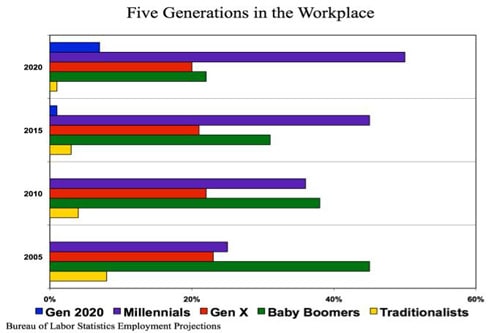
Every generation has defining experiences that have helped shape its values. For example, Generation Xers grew up at the peak of the Cold War, while Generation Z has never known life without a computer, nor the internet. For these reasons, and many more, it's important to consider how those differences affect the way you manage each generation.
What Leaders Need to Know about Managing Generational Differences in the Workplace
It's often assumed that the differences between generations are dramatic.
However, according to Universum Global's Generations series study, we're more alike than we are different:
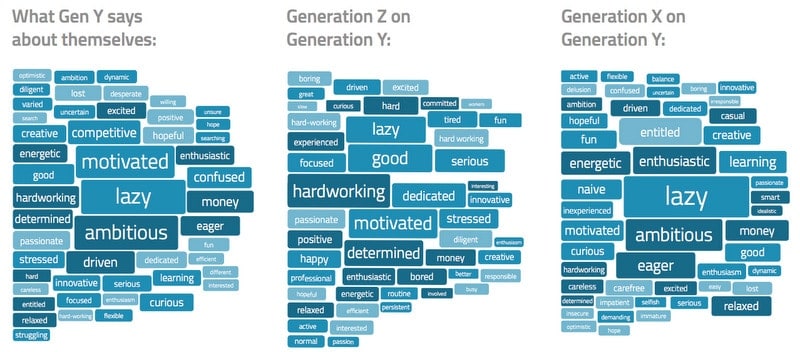
According to the same study, Gen X, Millennials, and Gen Z all share similar values and worries:
- Becoming a leader was important to the majority of each generation (57% Gen X, 61% Gen Y, 61% Gen Z),
- About half of each generation worried whether their personalities fit in where they worked (40% Gen X, 50% Gen Y, 50% Gen Z),
- They all worried about stress and work-life balance.
As a manager, this gives you a good idea of topics to cover with *everyone* you work with, regardless of age.
That being said, does it mean that you should manage each of these generations exactly the same? Not quite.
As it turns out, the same study found some meaningful differences as well.
Similar interests, different reasons.
One such example of key differences is in leadership. Gen X and Millennial employees are most interested in leadership opportunities to provide mentoring and coaching, while Gen Z is most interested in the added responsibility (source: Universum Global):
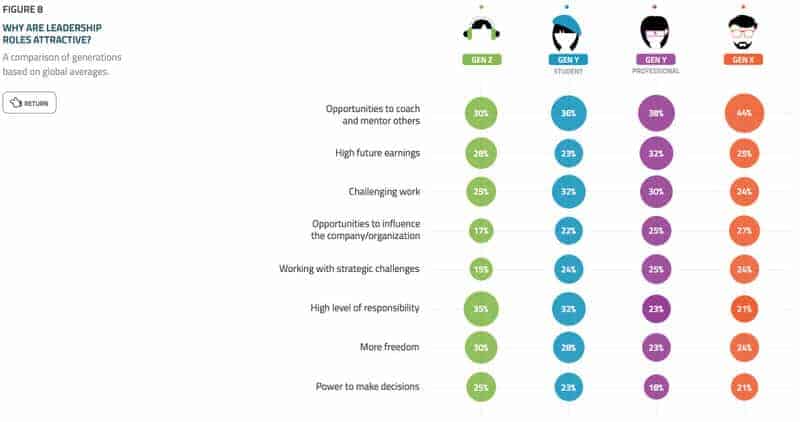
The study found other, more marginal differences, such as how virtual reality will affect the workplace. Not surprisingly, Millennials and Gen Z believe it will have a large impact on the workplace, while the older Gen X was more skeptical.
These differences are more about age than anything else, which brings us to the most important point of all when it comes to generational differences in the workplace.
It's the stages of life that make managing across generations difficult, and that's what we walk you through today.
Table of Contents:
- Why the Stages of Life Matter More than Generational Differences
- Tips You Can Use for Managing Across Generations
- Understanding Everyone as Individuals
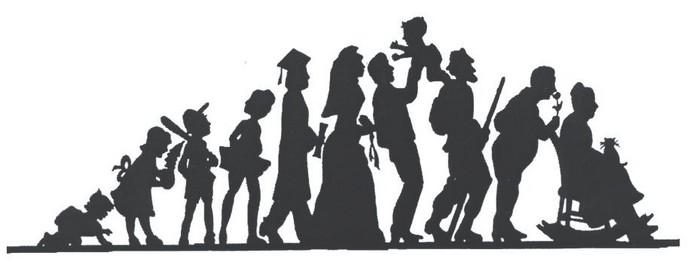
Why the Stages of Life Matter More than Generational Differences
While I was researching the topic, I remembered a story a friend told me about difficulties he'd had with an older employee due to generational differences.
He had recently transferred to take over sales at the clothing company he worked at, and was excited to apply some of the ideas he'd had about improving the department.
It was a big opportunity and, with aspirations of moving up, he knew this was his chance to impress his managers.
Best laid plans...
An older employee, a Gen Xer who had been in the department for years, didn't take well to any of his proposals to change.
For a while, progress stalled with my friend and the older man clashing at every proposal.
First, it was a resistance to shifting customer communications to those younger and more in tune with fashion trends. Because of their age and lifestyle, my friend believed they could better convince customers to buy. That, in turn, would increase sales on a consistent basis.
Later, my friend was met with resistance to moving sales orders to a digital format. It was a simple change that would greatly simplify the office's paper trail. And one that was long coming.
Unfortunately, that didn't matter to the older man, who was set in his ways. My friend was at his end and felt like his creative energy was being wasted, fighting to make what seemed to him like obvious improvements.

Fearing the future.
Once my friend built some rapport with his Gen X team member, he realized the problem wasn't the Gen X'ers desire for things to stay the same. It was their desire to be valued and for stability in employment.
All the changes made the older staff member feel like their skills weren't valued, and that they could be on the chopping block. This couldn't be further from the truth as their experience made them near irreplaceable for the department.
When you're young, you're eager to prove yourself and get more interesting work. But as you get older, and as you start and grow a family, you shift towards wanting stability and moving up so you can give your family a better life.
You can't manage a single person in their early 20s the same way you'd manage someone with a family and other responsibilities. They each want and value different things. And while that tends to track with age, not everyone does so at the exact same age.
A Gen Z staff member could start a family early, while a Gen X team member may do so late. All of this can happen while a Millennial chooses not to have a family at all, shifting their interests differently from others.

Managing generational differences starts with their stage of life.
To effectively manage employees of different generations, ask yourself:
- What stage of life are they in?
- How will their stage of life change what they want out of their work?
- How you can help reach the goals they share with you?
It's only when you openly talk about what's important to them, and where they're coming from that you can figure out their true motivations. This will help you identify blockers (like the Gen X team member's fear of being replaced) as well as opportunities to tap into what drives them.
To better inform these discussions of generational differences, it helps to have an understanding of where each working generation roughly is when it comes to stage of life.
Baby boomers: Getting ready for retirement and enjoying their golden years
By 2030, the entire Baby boomer generation – some 70 million of them – will be of the age of retirement or over. The priorities of this generation are therefore mostly centered on job stability and consistency, not toward changing career paths or moving up within the company.
That said, there are people who love what they do, so don't practice generational bias and assume they do not like learning.
Gen X: The ‘Sandwich’ Generation
54% of 40-year-olds and 36% of 50-year-olds in the United States are caring for both their parents and their children, according to a Pew Research Center report. The responsibility of providing care for immediate family is a large one, limiting Gen Xers’ time and adding a major financial toll. Health care, flexible schedules, and opportunities to boost their compensation may all be interesting to them because of this.
Millennials: Arriving at maturity and financial stability
No longer the new kids on the block, Millennials now are in the midst of big life changes such as buying a home and starting or growing families. After financial crises of the past decades delayed these kinds of decisions, they’re front and center as many Millennials are now in their 30s.
New priorities are emerging for Millennials; so-called “hustle culture” is losing out in favor of a better work-life balance, and health insurance and maternity/paternity leave are becoming more important to them.
Gen Z: Re-defining the job market
Still considered to be “emerging adults”, Gen Zers are currently experiencing early adulthood – a period marked by frequent changes in search for identity and stability after leaving the structures of formal education.
Growing up in a period of economic instability, Gen Z value flexible working arrangements, have an interest in company mission and values (like company culture, diversity, commitment to mental health, etc), and look for opportunities to establish their career and grow beyond entry level compensation.

Remember: Lifetime employment is a relic of the past.
The stages of life aren't the only thing that affects our goals and desires in the workplace. Similarly, it's important as a leaders to consider how the end of lifetime employment has affected all your team members.
Spending 40 years at the same company and getting a gold watch is long gone for all generations.
For Gen X and Boomers, it makes them more pragmatic about their role at your company, as well as more concerned with your company's growth or layoff plans. Most generations have seen the layoffs over the years during economic busts, and know any promises of long term employment are hollow.
In particular, Millennials entered the workforce during the hiring freezes of the Great Recession. They learned very early in their careers that company loyalty is a two-way street that closed long ago. They're excited about the opportunity to grow at your company, but they also realize that they can (or may have to) go somewhere else.
Finally, with Gen Z entering the workforce, a wholly new set of expectations and behaviors is being introduced to the average workplace.
LinkedIn insights show that members of the youngest working generation are most likely to quickly change jobs if the position or the company culture don’t suit them – meaning that companies (and managers) need to work hard to understand what employees they want to retain need to be more likely to stick around.
You earn a lot more trust with your team being honest about these things than trying to pretend otherwise. The elephant is still in the room, even if you avoid talking about it.

Tips You can use for Managing Across Generations
So far, we've explored the generational differences that exist today and the real issue behind those differences in the workplace. Now, let's look at some tips for managing across different generations you can use with your team.
Here are 3 tips for helping you manage anyone, younger or older alike:

1. Be aware of generational differences, but avoid generational bias
Founding partner of human resources consultancy Future Workplace and the coauthor of The 2020 Workplace, Jeanne C. Meister, captures the challenge well:
"It's important to be aware of generational tension– loosely defined as a lack of respect for someone who's of a different generation from you– among colleagues.”
A generational bias, or generational tension, means you believe that everyone of a certain generation is either inferior to your generation, or displays a certain negative behavior.
Some generational bias examples are:
- The belief that Millennials are self-obsessed and lazy.
- The idea that Gen Z have a short attention span and like to ‘job hop’.
- The notion that Baby Boomers have a hard time with office technology.
While these might seem like innocent jokes, generational biases can hurt your team’s relationships in the long run. They make managing generational differences at work harder than it has to be – so avoid using them or encouraging your team to.
Obviously, each generation does have some differences. However, some of those perceived differences may be more stereotype than constructive. Think about how you treat each employee, and consider if you're projecting a generational expectation, or if you're truly judging them as an individual.

Get to know your employees as individuals
I've seen my share of unfair labels placed on my generation, Millennials, in major publications, including: lazy, entitled, tech-addicted.
As you'd expect some of what public opinion identifies as Millennial I identify with, but much of it I don't. People are complex, so don't try to drop them into a bucket and assume everyone of a certain generation is the same.
It's important to get to know each team member, so you don't fall back on these stereotypes coloring how you see them. Chances are, you're good about this with your generation, but less so with those in different generations.
The better you work to get to know the person – their interests and goals – the easier it will be to lead them in spite of any generational differences. They'll trust you more, and you'll know how to better motivate them. That rings true across all generations.
Further reading:
Want to get to know your people better, so you can build trust and better motivate them? Start here:
- Do your team members each have a work best friend? Here’s a reminder of all the benefits of workplace friendships.
- Here's why leaders from the Navy to the workplace all agree you need to build rapport with everyone you manage.
- Here's 102 ways to build rapport with anyone of any generation on your team.
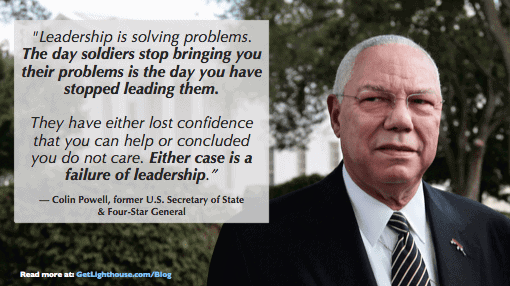
2. Encourage their feedback
One of the best ways to overcome the challenge of managing those younger or older than you is to encourage their feedback. By asking everyone on your team for feedback, you help them feel heard. You make them feel like they have a say in what's going on, and that you value their input, regardless of generational differences.
You can also think about how you give feedback. Apply the concept, Task Relevant Maturity, a principle made popular by former CEO and co-founder of Intel, Andy Grove.
In his legendary leadership book, High Output Management, Grove describes Task Relevant Maturity as:
"How often you monitor should not be based on what you believe your subordinate can do in general, but on his experience with a specific task and his prior performance with it – his task relevant maturity.
…as the subordinate's work improves over time, you should respond with a corresponding reduction in the intensity of the monitoring.”
Task Relevant Maturity is a way for you to measure how much support and monitoring is necessary to help that team member complete a task. If you give too little support for a new task, they will feel lost and unsupported. If you give too much when they're skilled at a task, they feel as though you don't trust them and that you're micromanaging.
When managing across generations, recognize that Task Relevant Maturity has no age; a young team member could be very skilled at a job, so you should be hands off and trust them. Equally possible, a more senior, older team member could be very new and uncomfortable with a task or new role, at which point discretely supporting them and coaching them is important to their success.
Keep in mind, feedback is a two-way street for you and your team. It's an essential part of successfully managing across generations, so make it a habit to ask for feedback and give it to your team.
Further Reading:
Thinking about improving feedback on your team? Here's some places to to start:
- Here's how to get more feedback from your team
- 5 creative ways to give more feedback to your team better than the sh*t sandwich.
- Need to get better at giving feedback? Here's how to give more constructive feedback.
- Think real time feedback is the answer? Here's why that's a terrible idea.
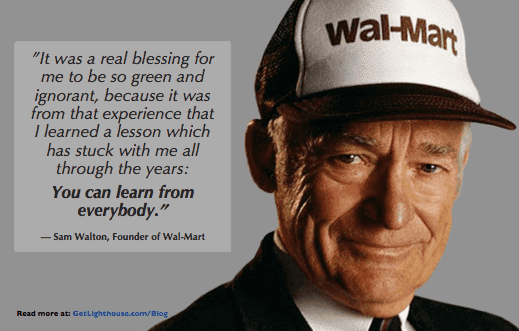
3. Create opportunities for cross-generational mentoring
For problems within your teams, you can create opportunities for members of different ages to work with and coach one another to bridge generational differences. By doing so, they can build rapport and trust with each other, and trade knowledge and skills.
It's easy for teams to self-organize around those they relate to most; often, that leads to generational divides where older team members spend time with older colleagues, and younger ones with their younger peers.
A great way to break down these natural tendencies is by having everyone bring their best knowledge to teach and share with everyone else. For example, The 2020 Workplace author Jeanne C. Meister suggested that on using mixed-work teams:
"Studies show that colleagues learn more from each other than they do from formal training, which is why it is so important to establish a culture of coaching across age groups.”
Doing this allows you to make the most of the skills your team members have, whether younger or older. They work together to make one another better as opposed to fighting, or avoiding one another.
Tap into the wisdom and experience of your team
Older employees are more likely to fall into mentor roles if you create an environment that encourages collaboration. This is valuable because it also allows for an environment to grow that doesn't always need your presence to solve a problem.
There are many things your older team members might know which they can be pulled in to help with. Plus, this helps your older employees feel more valued.
To put this in action, take some time to work with each of your team members to understand where their skills stand and how they want to grow. Then, compare everyone's skills and growth.
What you'll likely find is that there are places where one person is strong, and another would benefit from learning. Pairing them up is a great way to create strongest bonds, and helpful mentoring relationships.
If they don't know each other well, share some of what you've learned about the value of rapport, so they can do the same with each other when they meet.
Further Reading:
Starting discussions about how people can grow and learn new things? Here's some good places to start:
- Here's 3 helpful approaches for leading conversations on how to help your team achieve their goals
- If you struggle with growth that isn't fixed to titles and levels, look at how to grow your people without promotions here.
- Introduce 5 new habits to your routine to create a high-performing team.

Managing across generations is about understanding everyone as individuals
More important than generational differences is recognizing everyone on your team is a unique individual. We all experience the same desires, stresses, and pains. The difference is that what those desires, stresses, and pains are changing over time.
Ultimately, we want the same one thing: to be valued and appreciated. If you can help an employee do that, you can overcome any generational differences you may face.
Take time to talk to, and more learn about, each team member. The more you know about them the more you can help them get what they need. And that, in turn, maximizes their attitude and performance.
You can be a great manager regardless of your age and the generations of people you manage, if you use tactics like the ones we discussed today.





